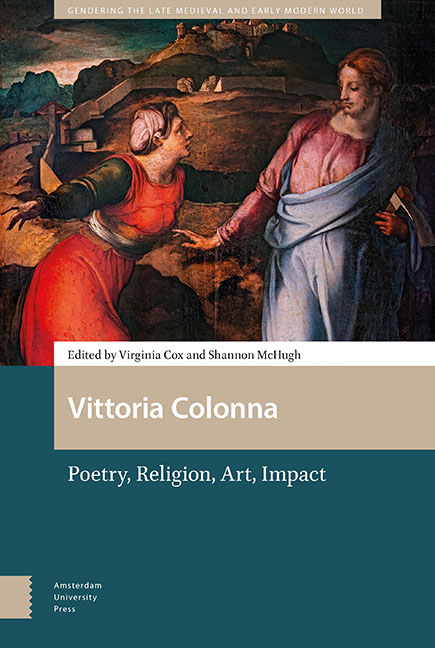Book contents
- Frontmatter
- Dedication
- Contents
- List of Illustrations
- Acknowledgements
- Introduction: The Twenty-First Century Vittoria Colonna
- Part 1 Literary and Spiritual Sociability
- Part 2 Widowhood
- Part 3 Poetry
- Part 4 Art
- Part 5 Readership
- Part 6 Impact
- Volume Bibliography
- Index of Citations of Colonna’s Letters and Verse
- Thematic Index
12 - ‘In Competition with and Perhaps More Felicitously Than Petrarch’: The Canonization of Vittoria Colonna in Rinaldo Corso’s Tutte le rime (1558)
Published online by Cambridge University Press: 16 December 2021
- Frontmatter
- Dedication
- Contents
- List of Illustrations
- Acknowledgements
- Introduction: The Twenty-First Century Vittoria Colonna
- Part 1 Literary and Spiritual Sociability
- Part 2 Widowhood
- Part 3 Poetry
- Part 4 Art
- Part 5 Readership
- Part 6 Impact
- Volume Bibliography
- Index of Citations of Colonna’s Letters and Verse
- Thematic Index
Summary
Abstract
This essay examines one of the most important documents in the reception of Colonna's poetry: the 1558 edition of her complete lyrics with the commentary of Rinaldo Corso. Earlier, partial versions were published in 1542 and 1543, during the author's lifetime, an honour not previously accorded to a living poet. I argue that the 1558 edition may be taken as a veritable testament of Colonna's canonization illustrating several facets of this process at work. In particular, through a reading of three key poems and their accompanying commentary, I demonstrate that Corso effectively places Colonna into dialogue with her classical and vernacular predecessors and inscribes her into literary history, including her among a canon of auctores from Homer to Petrarch.
Keywords: Vittoria Colonna, Rinaldo Corso, women's writing, reception, canon
This essay examines what is considered to be one of the most important documents in the history of the reception of Vittoria Colonna's poetry: the 1558 edition with the commentary of Rinaldo Corso (1525–80?) entitled Tutte le rime della illustriss[ima] et eccellentiss[ima] signora Vittoria Colonna, Marchesana di Pescara, printed in Venice by the Sessa brothers under the direction of Girolamo Ruscelli. The appearance of Corso's edition constitutes a momentous occasion not only in the history of women's writing, but also in that of the Italian literary tradition. Corso's commentary has its origins in lectures he delivered in Correggio at the court of Veronica Gambara, who is the dedicatee of the first two editions. Containing Corso's commentary on the rime spirituali alone, these two editions appeared in 1542 and 1543, during Colonna's lifetime, an honour not previously accorded to a living author of either sex. The only other vernacular author whose lyrics had received extensive commentary was none other than Petrarch.
Corso's commentary performed a literary and cultural function similar to that of contemporary commentaries on Petrarch. His meticulous construction of a canzoniere (songbook) from Colonna's scattered lyrics, in order to trace an itinerary of conversion from amor terreno (earthly love) in Part 1 to amor celeste (heavenly love) in Part 2, in the complete version of 1558 constitutes an attempt to demonstrate not only the unity of Colonna's corpus but also the fact that it mirrored the structure of the Petrarchan lyric sequence. Such an operation in and of itself acknowledges Colonna's status as an auctor comparable to Petrarch. This notion is corroborated by an analysis of the commentary.
- Type
- Chapter
- Information
- Vittoria ColonnaPoetry, Religion, Art, Impact, pp. 291 - 306Publisher: Amsterdam University PressPrint publication year: 2021

